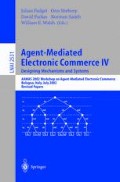Abstract
Agents in an electronic commerce system act on behalf of potentially competing individuals and organisations. It is proposed that such systems will be used in scenarios where legally binding contracts are made or money is exchanged by the agents on behalf of their owners. Agent owners may be reluctant to delegate tasks involving uncertain and possibly detrimental outcomes to an agent without assurances about the system’s properties. It may be a requirement, for example, that an agent cannot profit from lying to its peers. This paper demonstrates how solutions from game theory together with computing theories can be used to publicly specify rules and prove desirable properties for agent systems. This has the potential to increase the range of applications in which agent owners may be willing to delegate to their embedded counterparts.
Access this chapter
Tax calculation will be finalised at checkout
Purchases are for personal use only
Preview
Unable to display preview. Download preview PDF.
References
Axelrod, R. (1984). The evolution of cooperation. Basic Books, NewYork.
Béjar, J. and Cortés, U. (2001). Agent strategies on dpb auction tournaments. In Dignum, F., Cortés, U., Agent-Mediated Electronic Commerce III. Springer-Verlag.
Binmore, K. (1992). Fun and Games: A text on Game theory. D.C. Heath and Company, Lexington, Massachusetts.
Dignum, F. and Cortés, U. (2001). Agent-Mediated Electronic Commerce III. Springer-Verlag.
Easwaran, A. M. and Pitt, J. (2000). An agent service brokering algorithm for winner determination in combinatorial auctions. In European Conference on Artificial Intelligence. (ECAI), Berlin, Germany.
Eijk, R. M. v. (2000). Programming Languages for Agent Communication. PhD thesis, Department of Information and Computing Sciences, Utrecht University.
Esteva, M., Rodriguez, J., Sierra, C., and Garcia, P. (2001). On the formal specification of electronic institutions. In LNAI 1991, pages 126–147. Springer.
Guerin, F. and Pitt, J. (2001). Denotational semantics for agent communication languages. In Autonomous Agents 2001, Montreal, pages 497–504. ACM Press.
Larson, K. and Sandholm, T. (2001). Bargaining in computationally complex problems: Deliberation equilibrium. Artificial Intelligence, 132(2):183–217.
Manna, Z. and Pnueli, A. (1995). Temporal Verification of Reactive Systems (Safety), vol.2. Springer-Verlag, NewYork, Inc.
Myerson, R. B. (1981). Optimal auction design. Mathematics of Operations Research, 6(1):58–73.
Parkes, D. C. (2000). Optimal auction design for agents with hard valuation problems. In Agent Mediated Electronic Commerce II: Towards Next-Generation Agent-Based Electronic Commerce Systems (LNAI1788), Eds: Moukas et al., Springer.
Pradella, M. and Colombetti, M. (2001). A formal description of a practical agent for ecommerce. In Dignum, F., Cortés, U., Agent-Mediated Electronic Commerce III. Springer-Verlag.
Rosenschein, J. and Zlotkin, G. (1994). Rules of Encounter. MIT Press, Cambridge, MA.
Sandholm, T. (1996). Negotiation among Self-Interested Computationally Limited Agents. PhD thesis, University of Massachusetts at Amherst, Department of Computer Science.
Sandholm, T. (1997). Unenforced ecommerce transactions. IEEE Internet Computing. Special issue on Electronic Commerce. Nov–Dec, 1(6):47–54.
Sandholm, T., Suri, S., Gilpin, A., and Levine, D. (2001). Cabob:Afast optimal algorithm for combinatorial auctions. In International Joint Conference on Artificial Intelligence, pages 1101–1108. (IJCAI), Seattle,WA.
Singh, M. (1999). An ontology for commitments in multiagent systems: Toward a unification of normative concepts. Artificial Intelligence and Law, 7:97–113.
Singh, M. (2000).Asocial semantics for agent communication languages. In IJCAIWorkshop on Agent Communication Languages, Springer-Verlag, Berlin.
Vickrey, W. (1961). Counterspeculation, auctions, and competitive sealed tenders. Journal of Finance, 16(1):8–37.
Wooldridge, M. (2000). Semantic issues in the verification of agent communication languages. Journal of Autonomous Agents and Multi-Agent Systems, 3(1):9–31.
Author information
Authors and Affiliations
Editor information
Editors and Affiliations
Rights and permissions
Copyright information
© 2002 Springer-Verlag Berlin Heidelberg
About this paper
Cite this paper
Guerin, F., Pitt, J. (2002). Guaranteeing Properties for E-commerce Systems. In: Padget, J., Shehory, O., Parkes, D., Sadeh, N., Walsh, W.E. (eds) Agent-Mediated Electronic Commerce IV. Designing Mechanisms and Systems. AMEC 2002. Lecture Notes in Computer Science(), vol 2531. Springer, Berlin, Heidelberg. https://doi.org/10.1007/3-540-36378-5_16
Download citation
DOI: https://doi.org/10.1007/3-540-36378-5_16
Published:
Publisher Name: Springer, Berlin, Heidelberg
Print ISBN: 978-3-540-00327-4
Online ISBN: 978-3-540-36378-1
eBook Packages: Springer Book Archive

